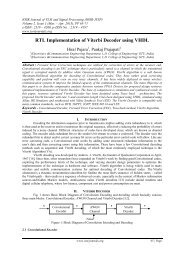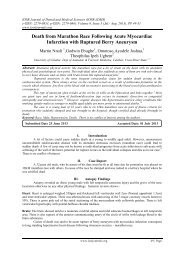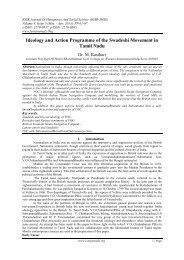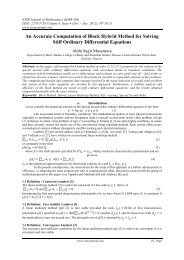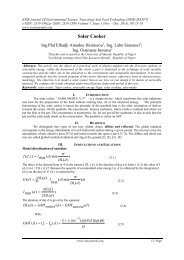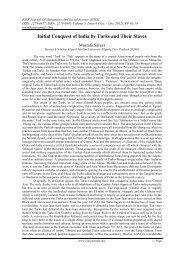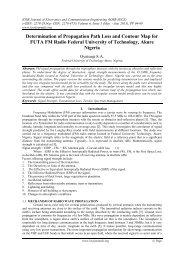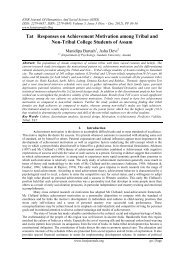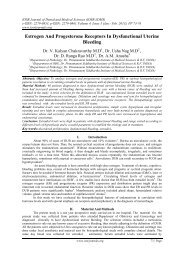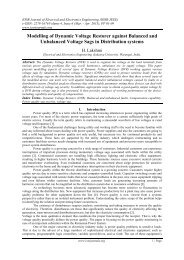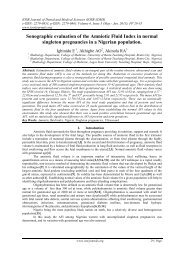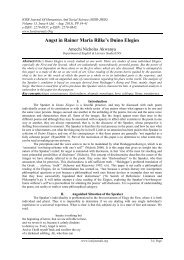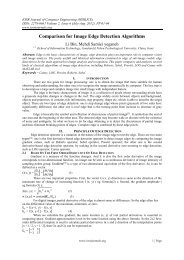Design Compatibility of Classroom Furniture in Urban and ... - IOSR
Design Compatibility of Classroom Furniture in Urban and ... - IOSR
Design Compatibility of Classroom Furniture in Urban and ... - IOSR
Create successful ePaper yourself
Turn your PDF publications into a flip-book with our unique Google optimized e-Paper software.
Fuel Subsidy Removal And M<strong>in</strong>d Control Game In Nigeria: A Critical Discourse Analysis Perspective<br />
exclusion which <strong>in</strong>clude constra<strong>in</strong>ed access to justice system (determ<strong>in</strong>ed by f<strong>in</strong>ancial leverage) <strong>and</strong> constra<strong>in</strong>ed<br />
rights to electoral/political participation.<br />
Given that price <strong>of</strong> crude oil is a key driver <strong>of</strong> fuel prices the world over, the issue is really not subsidy<br />
but hav<strong>in</strong>g a proper pric<strong>in</strong>g model <strong>in</strong> a world <strong>of</strong> powerful ‗oligopolists,‘ Bello (2011). A fair price from the po<strong>in</strong>t<br />
<strong>of</strong> view <strong>of</strong> a consumer would be one that is affordable, reflects market realities <strong>and</strong> excludes <strong>in</strong>efficiencies. In<br />
essence, the Jonathan adm<strong>in</strong>istration needs to go beyond the usual threadbare <strong>and</strong> worn-out pedestrian economic<br />
arguments for fuel-subsidy removal to remove all the market imperfections <strong>and</strong> <strong>in</strong>stitutionalise a credible<br />
pric<strong>in</strong>g mechanism, which Nigerians would trust <strong>and</strong> smooth out the sludge <strong>of</strong> systemic <strong>in</strong>efficiencies clogg<strong>in</strong>g<br />
the wheel <strong>of</strong> economic development. Nonetheless, if the powerful group rema<strong>in</strong>s unrelent<strong>in</strong>g <strong>in</strong> recit<strong>in</strong>g the<br />
wonky <strong>and</strong> weather beaten arguments for removal <strong>of</strong> the so called fuel subsidy, then the less powerful group<br />
must take the adversary‘s disposition as the last battle it must fight for its survival <strong>and</strong> approach it with all the<br />
seriousness it dem<strong>and</strong>s.<br />
The forego<strong>in</strong>g represents the efforts <strong>of</strong> the presumably less-powerful group to control the fuel subsidy<br />
discourse <strong>and</strong> by extension control the m<strong>in</strong>ds <strong>of</strong> Nigerians. It reveals the ideological lean<strong>in</strong>gs <strong>in</strong> the discourse <strong>of</strong><br />
socioeconomic developments <strong>in</strong> Nigeria as constructed by the different social groups.<br />
3.3 The ‘Different Angles <strong>of</strong> Tell<strong>in</strong>g’<br />
The ‗different angles <strong>of</strong> tell<strong>in</strong>g,‘ (Salami & Ayoola, 2010: 52), harks back to van Dijk (2006: 379)<br />
position about media-political discourse as one that is replete with manipulative strategies which <strong>in</strong>clude<br />
―emphasiz<strong>in</strong>g one's own power <strong>and</strong> moral superiority, discredit<strong>in</strong>g one's opponents, polarization between Us <strong>and</strong><br />
Them, negative Other-presentation, ideological alignment, <strong>and</strong> emotional appeals.‖ From the tenor <strong>of</strong> the<br />
argument, it shows how the federal government backed by its ardent supporters rides on the crest <strong>of</strong> World Bank<br />
<strong>and</strong> IMF-driven economic logic to goad Nigerians <strong>in</strong>to accept<strong>in</strong>g the economic policy. In this regard, the<br />
group‘s logical fabric <strong>of</strong> subsidy removal is woven around the presumed existence <strong>of</strong> a faceless cabal that is<br />
cart<strong>in</strong>g away hundreds <strong>of</strong> millions <strong>of</strong> dollars from the government <strong>in</strong> the name <strong>of</strong> fuel subsidy. In other words,<br />
the subsidy meant to benefit the poor Nigerian masses only ends up enrich<strong>in</strong>g the very few Nigerians <strong>in</strong> the oil<br />
supply cha<strong>in</strong>. The only sensible to do is to remove the subsidy <strong>and</strong> channel the proceeds <strong>in</strong>to ‗provid<strong>in</strong>g safety<br />
nets‘ for the poor.<br />
The Senate President, David Mark, who blamed the controversy on the cabals <strong>in</strong> the petroleum<br />
<strong>in</strong>dustry, vowed that the Senate would uncover those that short-changed Nigerians <strong>in</strong> the process. His words:<br />
―My belief is that there is a cartel with<strong>in</strong> the petroleum <strong>in</strong>dustry <strong>and</strong> whatever they do is just exclusive to them.<br />
N<strong>in</strong>ety per cent <strong>of</strong> people outside do not know. We must f<strong>in</strong>d out how much is spent on subsidy, who are the<br />
beneficiaries? Has subsidy benefited us? These are salient po<strong>in</strong>ts <strong>and</strong> we cannot run away from them.‖ The other<br />
group <strong>in</strong> this m<strong>in</strong>d control duel maximises it‘s access to the media to puncture government‘ argument on the<br />
grounds that the economic policy not only lacks proper def<strong>in</strong>ition but that it is <strong>in</strong>imical to the general well-be<strong>in</strong>g<br />
<strong>of</strong> Nigerians.<br />
The deafen<strong>in</strong>g chatter about petroleum subsidy does not expla<strong>in</strong> who erected the ubiquitous <strong>and</strong><br />
amorphous cabal <strong>in</strong> the first place neither does it bother to <strong>of</strong>fer a precise def<strong>in</strong>ition <strong>of</strong> what exactly constitute<br />
this ‗strange animal‘ called fuel subsidy. This is the crux <strong>of</strong> Chidi Amuta‘s worry:<br />
Is the subsidy a cult secret? Why is it unknowable? Is it the opportunity cost <strong>of</strong> sell<strong>in</strong>g imported fuel <strong>in</strong>stead <strong>of</strong><br />
ref<strong>in</strong><strong>in</strong>g here? Is it the penalty ord<strong>in</strong>ary people have to pay <strong>in</strong> aid <strong>of</strong> those who have serially sabotaged our<br />
ref<strong>in</strong>eries? Is it the differential between what poor Nigerians mostly on $1 a day pay for a litre <strong>of</strong> petrol to power<br />
their smoky bikes <strong>and</strong> what affluent Europeans <strong>and</strong> Americans on a m<strong>in</strong>imum N200, 000 a month pay for the<br />
same commodity? What is the relationship between the projected pump price <strong>of</strong> petrol <strong>and</strong> the purchas<strong>in</strong>g power<br />
<strong>of</strong> an average Nigerian <strong>in</strong> a nation with one <strong>of</strong> the highest unemployment rates <strong>in</strong> the world? Go<strong>in</strong>g forward, by<br />
what percentage do we adjust petrol pump prices to compensate for <strong>in</strong>ternational oil price <strong>in</strong>creases that we have<br />
absolutely no control over? Are we go<strong>in</strong>g to leave the field open aga<strong>in</strong> so that the next adm<strong>in</strong>istration that comes<br />
along can burst the budget <strong>and</strong> take easy recourse to petrol tax under the guise <strong>of</strong> subsidy removal?<br />
(www.thisdaylive.com 15 November 2011)<br />
The failure to provide plausible answers to these <strong>and</strong> other pert<strong>in</strong>ent questions derive ma<strong>in</strong>ly from the<br />
communication deficit <strong>of</strong> the Jonathan fuel subsidy campaign, which <strong>in</strong> the op<strong>in</strong>ion <strong>of</strong> Amuta, is fast becom<strong>in</strong>g<br />
part <strong>of</strong> the overall basket <strong>of</strong> perception liabilities <strong>of</strong> the adm<strong>in</strong>istration that cont<strong>in</strong>ues to mount. What it costs<br />
Nigeria <strong>in</strong> terms <strong>of</strong> facts <strong>and</strong> figures to susta<strong>in</strong> the subsidy is a matter <strong>of</strong> convoluted conjectural postulations for<br />
advocates <strong>of</strong> subsidy removal, who churn out conflict<strong>in</strong>g figures to justify government‘s desperation to compel<br />
poor hapless Nigerians to pay more for petroleum products so that it can get more money to carry on with<br />
bus<strong>in</strong>ess as usual. For reasons that are as diverse as they are self-serv<strong>in</strong>g, the State Governors have a different<br />
set <strong>of</strong> figures from the Federal Government just as the NNPC has a completely different set <strong>of</strong> figures on the<br />
basis <strong>of</strong> which it is alleged to cream <strong>of</strong>f homologous sums <strong>of</strong> petrodollars with cl<strong>in</strong>ical efficiency from the<br />
federation account every month.<br />
www.iosrjournals.org<br />
11 | Page



